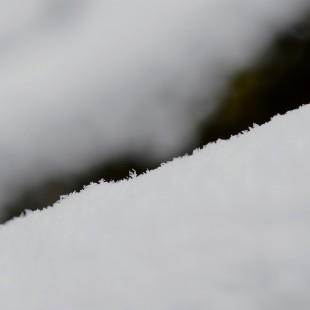
Cherry Tree
December 16 - First snow of the season.
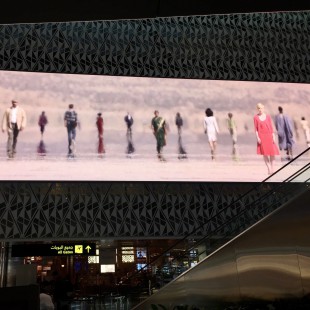
Video Art
December 9 - Transit Lounge, Hamad International Airport, Doha, Qatar. I am still beeing processed through the security check on my way to the departure gates, when I see the gigantic LED panel: 23 meters long, more than 4 meters high. Crossroads (2014) by Bill Viola. 24 people walking through the heat haze of a desert - in slow motion. "The Crossroads creates an intersection between...two streams of human existence. ...the living reality of travelers encountering the work laterally as they walk along its length, with virtual figures pulsating in the heat of the desert, emerging from mirages and advancing toward the travelers. As they approach, each figure crosses a threshold from mirage to clarity as it moves toward the viewer, making visible their humanity and individuality, from young to old, from all cultures and races, with the endless dunes of the desert in the distance." (Bill Viola) And - refering to another piece - the artist said: "We have to reclaim time itself, wrenching it from the ‘time is money’ maximum-efficiency mentality, and make room for it to flow the other way - towards us. We must take time back into ourselves, to let our conciousness breathe and our cluttered minds be still and silent. This is what art can do in todays world."
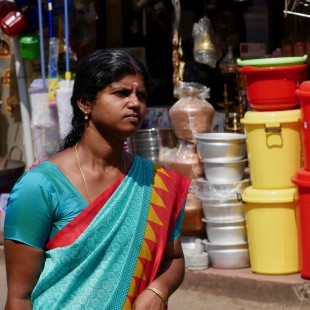
Places
December 6 - Thiruvananthapuram is the busiest city in Kerala, and Chalai Bazaar is the busiest street market in Thiruvananthapuram. Gold and silver jewelry (pay by weight), fruit and vegetables, paint and hardware, flowers and decoration, pots and pans. “The further down you venture, the more endless it seems, and yet the further you go, the more you realize that this road which sells random goods is in fact full of details that encompass need, culture, faith, desire, and a truthfulness of life in Kerala. It is a market where you may come to buy new knives or a bathroom mirror, but end up leaving with a broom, two hardback notebooks, a child’s cricket bat, and an understanding for a version of India that is both genuine and still indefinable.” (Manzar Samii, culture trip)
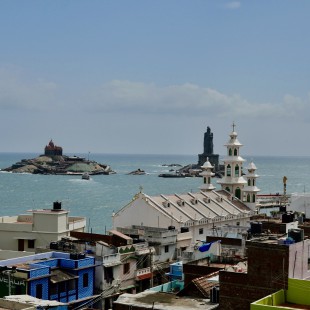
Sightseeing
December 2 - Kanyakumari in Tamil Nadui is the southernmost city of India. It marks its end. Here the Bay of Bengal, the Indian Ocean and the Arabian Sea blend together. It′s a major pilgrim destination for Hindu believers. People come here to see the sun rise and the sun set. On a rickety overloaded ferry I go out to visit a small island. According to local legend it was here that Goddess Kumari performed austerity. The church like memorial was built in honour of Swami Vivekananda, an Indian Hindu monk. During his wandering years Vivekananda had seen the sufferings of ordinary people. When he reached Kanyakumari on 24 December 1892 he was still unable to formulate an idea to help the masses of the country. He swam across the ocean to the large mid-sea rock and started meditating. His meditation continued for three days. Later he wrote: “At Cape Comorin, sitting in Mother Kumaris temple, sitting on the last bit of Indian rock—I hit upon a plan: We are so many Sannyasins wandering about, and teaching the people metaphysics—it is all madness. Did not our Gurudeva use to say, ‘An empty stomach is no good for religion?’ That those poor people are leading the life of brutes is simply due to ignorance. We have for all ages been sucking their blood and trampling them underfoot.” As a result of his insights he decided to dedicate the rest of his life to the welfare of the common people of India.
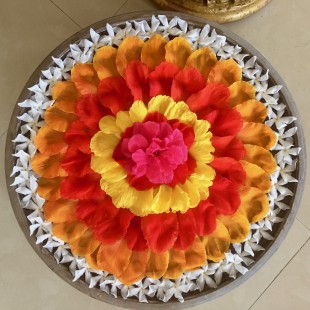
Wellness
November 16 to 30 - Ayurveda in Pulinkudy, Kerala: Abhyangam, Shirodhara, Thalam, Elakizhy, Udhwarthanam, Greevavasthy, Karnapooranam. Plus delicious vegetarian food - and a found paperback. Philip Roth, The Human Stain: “Because we don′t know, do we? Everyone knows… How what happens the way it does? What underlies the anarchy of the train of events, the uncertainties, the mishaps, the disunity, the shocking irregularities that define human affairs? Nobody knows. ‘Everyone knows’ is the invocation of the cliché and the beginning of the banalization of experience, and it′s the solemnity and the sense of authority that people have in voicing the cliché that′s so insufferable. What we know is that, in an unclichéd way, nobody knows anything. You can′t know anything. The things you know you don′t know. Intention? Motive? Consequence? Meaning? All that we don′t know is astonishing. Even more astonishing is what passes for knowing.”
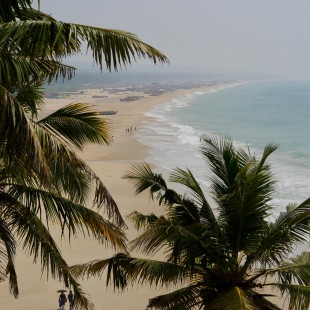
Walking
November 12 - Thiruvananthapuram, Kerala, India. I walk along Chowara Beach from Aazhimala Siva Temple south towards Poovar Island. It is a long sandy fisherman′s beach with hundreds of boats sitting on the sand. The local fisherman go out before sunset, and when they come back early in the morrning they push the heavy wooden boats with great physical effort back onto the beach. Bald eagles circle in the sky.
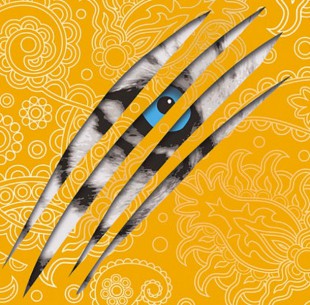
Reading
November 10 - The White Tiger by Aravind Adiga. First published in 2008 the novel “follows a darkly comic Bangalore driver through the poverty and corruption of modern India’s caste society”.(Simon & Schuster) Balram Halwai is the narrator of the story and its protagonist. He is a driver, a murderer, an entrepreneur, and a thinker: “Me, and thousands of others in this country like me, are half-baked, because we were never allowed to complete our schooling. Open our skulls, look in with a penlight, and you′ll find an odd museum of ideas: sentences of history or mathematics remembered from school textbooks (no boy remembers his schooling like the one who was taken out of school, let me assure you), sentences about politics read in a newspaper while waiting for someone to come to an office, triangles and pyramids seen on the torn pages of the old geometry textbooks which every tea shop in this country uses to wrap its snacks in, bits of All India Radio news bulletins, things that drop into your mind, like lizards from the ceiling, in the half hour before falling asleep--all these ideas, half formed and half digested and half correct, mix up with other half-cooked ideas in your head, and I guess these half-formed ideas bugger one another, and make more half-formed ideas, and this is what you act on and live with.”
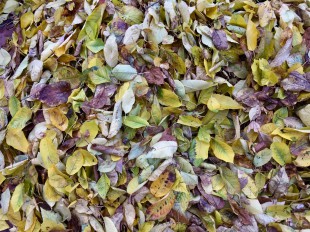
Cherry Tree
November 8 - Les feuilles Mortes.
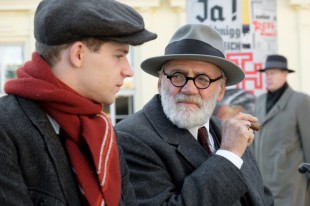
Movies
November 6 - Der Trafikant at Paladin in Mainz. The film is based on the international bestseller by Austrian novelist Robert Seethaler (The Tobacconist). With Simon Morzé as Franz Huchel and Bruno Ganz as Sigmund Freud; directed by Nikolaus Leytner. "Seventeen-year-old Franz journeys to Vienna to apprentice at a tobacco shop. There he meets Sigmund Freud, a regular customer, and over time the two very different men form a singular friendship. When Franz falls desperately in love with the music-hall dancer Anezka, he seeks advice from the renowned psychoanalyst, who admits that the female sex is as big a mystery to him as it is to Franz. As political and social conditions in Austria dramatically worsen with the Nazis’ arrival in Vienna, Franz, Freud, and Anezka are swept into the maelstrom of events. Each has a big decision to make: to stay or to flee?" (epofilm)
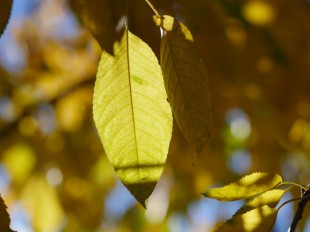
Cherry Tree
November 5 - Almost ready to let go.
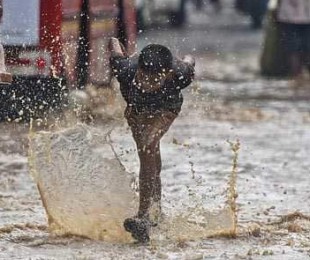
Reading
October 22 - Chasing the Monsoon - A Modern Pilgrimage by Alexander Frater, published in 1990. Revealing story of a journey through India in pursuit of the astonishing Indian summer monsoon. A trip from the tropical town of Trivandrum to Cherrapunji, "the wettest place on earth". “A line of spectators had formed behind Kovalam beach road. They were dressed with surprising formality, many of the men wearing ties and the women fine saris which streamed and snapped in the wind. There excitement was shared and sharply focussed, like that of a committee preparing to greet a celebrated spriritual leader, or a victorious general who would come riding up the beach on an elephant; all they lacked was welcoming garlands of marigolds. As I joined them they greeted me with smiles, a late guest arriving at their function. The sky was black, the sea white. Foaming like champagne it surged over the road to within a few feet of where we stood. Blown spume stung our faces. It was not hard to imagine why medieval Arabs thought winds came from the ocean floor, surging upwards and making the surface waters boil as they burst into the atmosphere."
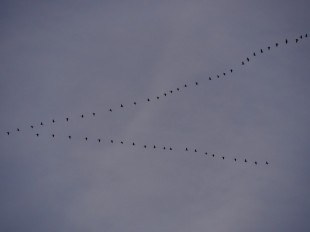
Migration
October 20 - There they go again. Southbound. Time to make travel plans.
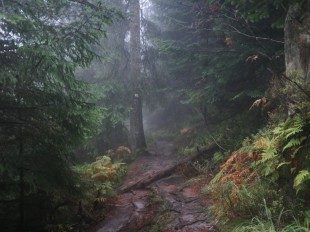
Walking
October 3 - Day of German Unity, a day in the Northern Black Forest: Ruhestein, Wilder See, Darmstädter Hütte.
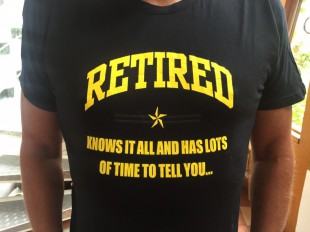
Work
September 30 - Retired from teaching at Robert Schumann University of Music in Düsseldorf. Thanks for the T-shirt, Micha!
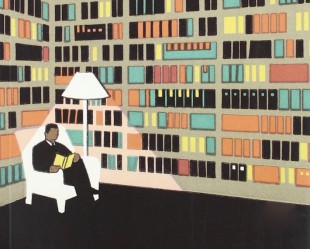
Reading
September 29 - Stoner, a novel by John Williams, published in 1963 - and soon forgotten. It took more than fifty years for the book to become an unexpected bestseller after it was republished in 2006. "William Stoner is born at the end of the nineteenth century into a dirt-poor Missouri farming family. Sent to the state university to study agronomy, he instead falls in love with English literature and embraces a scholar’s life, so different from the hardscrabble existence he has known. And yet as the years pass, Stoner encounters a succession of disappointments: marriage into a “proper” family estranges him from his parents; his career is stymied; his wife and daughter turn coldly away from him; a transforming experience of new love ends under threat of scandal. Driven ever deeper within himself, Stoner rediscovers the stoic silence of his forebears and confronts an essential solitude.” (blurb)
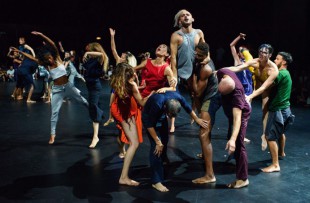
Dance
September 19 - A production of Sasha Waltz & Guests in coproduction with Ruhrtriennale at Jahrhunderthalle in Bochum: EXODUS. "‘What would you like to escape from? Where do you think is Utopia?’ were the questions with which Sasha Waltz and the dancers entered into this project.’" (program notes). Original music by Soundwalk Collective!
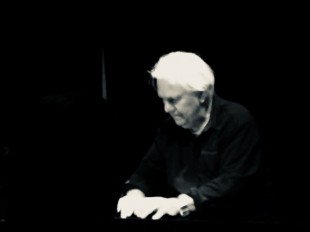
Live Music
September 17 - Another "musicmonday" at sound studio Klangraum in Mainz-Gonsenheim. With Burkard Schmidl (key) and Jochen Volpert (g). Burkhard Schmidl I remember from the old days, the groovy 70s in Mainz. He was the keyborder of Missus Beastly and than later of Dissidenten (The Rolling Stone called them the "the Godfathers of World-Beat").
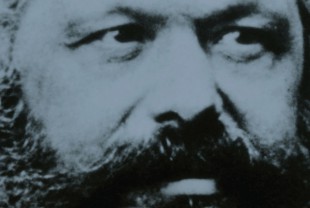
Reading
September 2 - Marx. Der Unvollendete (The Unfinished One) by Jürgen Neffe. Presently available only in German. “For the bicentennial of Marx’s birthday, Jürgen Neffe explores the causes of the current renaissance – in Marx’s writings and in his life story. He portrays the life of a refugee who had become stateless and who was willing to make any sacrifice for his convictions. Neither illness nor poverty, nor marriage troubles nor family tragedies kept him from his committed work. With his analysis of capitalism, Marx anticipated the globalised world of our day and even the recent financial crises.” (Random House)
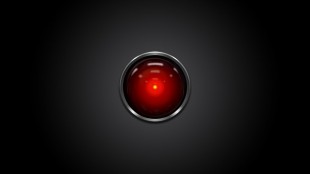
Replay
August 16 - I was sixteen when - in 1968 - I saw 2001: A Space Odyssey for the first time - a truly mind blowing experience. Today, in a 50th anniversary show at the Deutsches Filmmuseum in Frankfurt, I watch Stanley Kubrick′s unrivaled masterpiece again, on a new, unrestored 70 mm print. This time I watch it with my twenty year old son. Similarly mind-blowing. “I′m sorry Dave, I am afraid I can′t do that!” (HAL 9000)
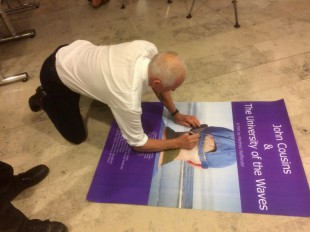
Work
August 6 - Preview of John Cousins & The University of the Waves for collaborators, colleagues and friends at Murnau Filmtheater in Wiesbaden. Among the audience are John Cousins and his partner Colleen Anstey (the two protagonists of the film from New Zealand), Armin Riegel (editing), Andreas Radzuweit (5.1 sound mix) and a number of former students from the Institute for Music and Media in Duesseldorf. Thanks for coming, folks!
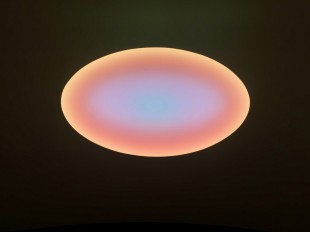
Exhibition
August 4 - James Turrell - The Substance of Light at the Museum Frieder Burda in Baden-Baden. "The artist himself constantly emphasizes that his work is best described as «Perceptual Art». In large-scale, atmospheric installations, he makes light materialize and leads onlookers to the limits of perception."(catalog)
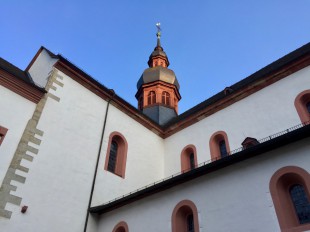
Concert
August 2 - Rheingau Musik Festival, "Vienna Nights II". In the courtyard of the 800-year old former cistercian Eberbach Monestary, on a very warm summer evening, under a darkening blue sky, we listen to the Stuttgart Chamber Orchestra conducted by Matthias Foremny. They play Joseph Haydn (Symphony No. 8 in G major "Le Soir" and the Cello Concerto in C major, violoncello: Sheku Kanneh-Mason) and Franz Schubert (Five German Dances and the Symphony No. 5 in B-flat major).
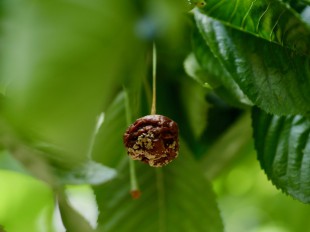
Cherry Tree
June 24 - Leftover for the birds.
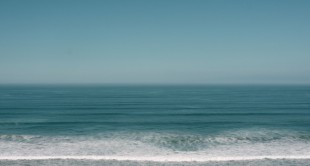
Work
June 20 to 22 - In his 4k grading suite Matthias Kirketerp from die Colorie in Duesseldorf is going through John Cousins & The University of the Waves take by take - and gives it the perfect look.
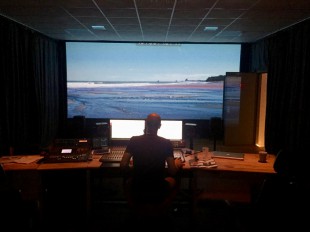
Work
June 6 to 8 - Mixing the 5.1 surround sound for John Cousins & The University of the Waves at klangBezirk in Wiesbaden. Sound engineer Andreas Razuweit ( an alumnus of the University of Music in Duesseldorf) and his partner Moritz Corell are very attentive and work highly concentrated. It’s a great pleasure to hear the whole thing come alive.

Reading
June 1 - The Rings of Saturn is a book by German writer W.G. Sebald, that was published in 1995 in German and three years later in a translation by Michael Hulse in English. In German it has a subtitle: Eine englische Wallfahrt (An English Pilgrimage). What looks like a travel book at first sight, telling about a walking tour through Suffolk, turns out to be "a hybrid of a book: fiction, travel, biography, myth, and memoir". By wandering through a dull landscape the narrator also wanders from topic to topic and comes across some sustainable insights “From the first smouldering taper to the elegant lanterns whose light reverberated around eighteenth-century courtyards and from the mild radiance of those lanterns to the unearthly glow of the sodium lamps that line the Belgian motorways, it has all been combustion. Combustion is the hidden principle behind every artefact we create. The making of a fish-hook, manufacture of a china cup, or production of a television programme, all depend on the same process of combustion. Like our bodies and like our desires, the machines we have devised are possessed of a heart which is slowly reduced to embers.”
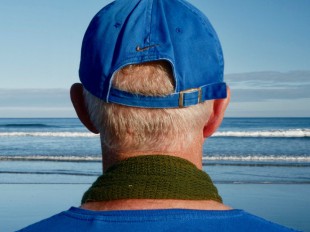
Work
May 28 - Done! Picture lock! The editing of the material I shot in New Zealand in 2016 is completed (film editor: Armin Riegel). The portrait of composer / sonic artist John Cousins has a total duration of 76 minutes, the title is: John Cousins & The University of the Waves.
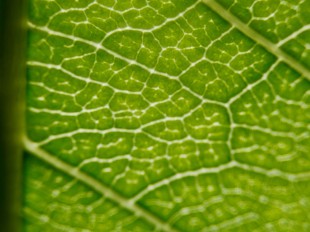
Cherry Tree
May 26 - “It is only while in a dreamy, slumbrous, half-mesmerized state that nature’s ancient papyrus roll can be read— only when the mind is at rest, separated from care and labour; when the body is at ease, luxuriating in warmth and delicious languor; when the soul is in accord and sympathy with the sunlight, with the leaf, with the slender blades of grass, and can feel with the tiniest insect which climbs up them as up a mighty tree.” (Richard Jefferies: Nature and Eternity, 1895)
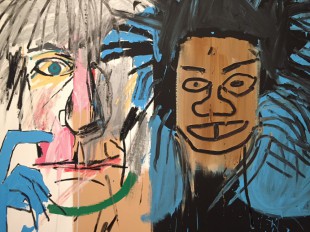
Exhibition
May 13 - At Schirn Kunsthalle Frankfurt: Basquiat. "In the late 1970s, Jean-Michel Basquiat teamed up with Al Diaz to write enigmatic graffiti statements across New York City under the pseudonym SAMO©. Soon he was collaging baseball cards, creating his own clothing, and painting on doors, window frames, and enormous home-made canvases. Today, Basquiat (1960–1988) is recognised as one of the most significant painters of the 20th century. Having come of age in the post-punk underground art scene in Lower Manhattan, he conquered the art world and gained widespread international recognition, becoming the youngest artist ever to participate in documenta in Kassel in 1982." (Schirn Kunsthalle)
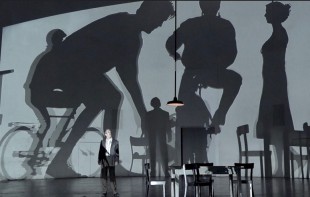
Theater
May 10 - International May Festival Wiesbaden. Tod eines Handlungsreisenden (Death of a Salesman) by Arthur Miller from Deutsches Theater Berlin. In a staging by Bastian Kraft, with Ulrich Matthes as Willy Loman: “I ’m gonna show you and everyone else that Willy Loman did not die in vain. He had a good dream. It’s the only dream you can have - to come out number one man.” (Arthur Miller, Death of a Salesman)
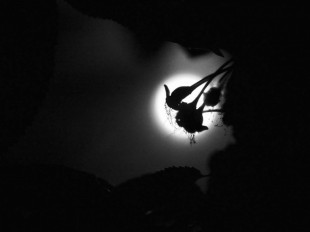
Cherry Tree
April 30 - Under the (full) Cherry Moon.

Reading
April 23 - The God of Small Things, semi-autobiographical novel by Arundhati Roy (published in 1997). It is set in 1969 and tells the story of Rahel and Estha, twins growing up among the banana jam vats and peppercorns of their blind grandmother’s pickles factory, and amid scenes of political turbulence in Kerala.“The book explores how the small things affect people’s behavior and their lives.” (Wikipedia) “...the secret of the Great Stories is that they have no secrets. The Great Stories are the ones you have heard and want to hear again. The ones you can enter anywhere and inhabit comfortably. They don’t deceive you with thrills and trick endings. They don’t surprise you with the unforseen. They are as familiar as the house you live in. Or the smell of your lover’s skin. You know how they end, yet you listen as though you don’t. In the way that although you know that one day you will die, you live as though you won’t. In the Great Stories you know who lives, who dies, who finds love, who doesn’t. And yet you want to know again. - That is their mystery and their magic.” (Arundhati Roy in ‘The God of Small Things’)
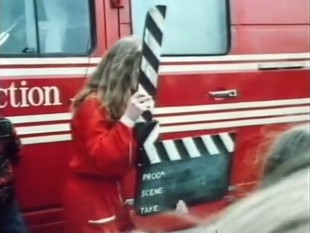
Personal History
April 20 - In the late 1970s (40 years ago!) I worked at Inter Action in London, a community arts center founded by ED Berman. At the time the Council of Europe described Inter Action Trust as “the most exciting community education/arts organization in Europe”. “Its most dynamic innovation was the Inter-Action Community Media Van. This large van was modified to show video from its side, back projection film viewed from the rear with a theater platform on the roof. It had a copying machine to produce instant leaflets and a sound system to announce its arrival and purposes. Perhaps its most unique feature was one of the first few radiotelephone systems in the UK, which was installed and used to ring mayors and council leaders for the gathered locals to put questions to the usually distant authorities. This was an experiment in doorstep democracy. New methods for public participation were tested and developed.” At present a few of the films and videos are presented with others from that era, as part of the Rebel Video 2018 Tour. “It is a book launch event with screenings and discussion. The aim of the tour is to stimulate discussion about the video movement of the 70s and 80s and its relevance for film/video activism today."
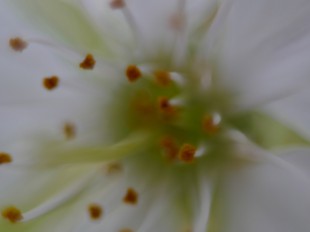
Cherry Tree
April 15 - Hanami.
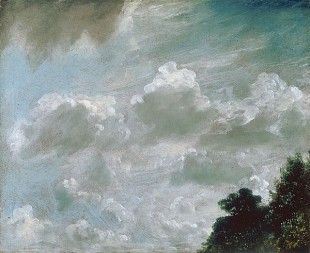
Reading
April 14 - Wolkendienst - Figuren des Flüchtigen (‘Cloud Service’ - at present available only in German) by Klaus Reichert . A smorgasbord of literary delicacies: all about clouds. The author quotes from his own cloud diary and consults the experts: William Turner, John Ruskin, Johann Wolfgang Goethe, Jean Paul, Caspar David Friedrich, Carl Gustav Carus, Alfred Stieglitz. And - of course - John Constable: “The sky is the source of light in nature, and governs every thing. Even our common observations on the weather of every day, are suggested by them, but it does not occur to us. Their difficulty in painting both as to composition and execution is very great, because, with all their brilliancy and consequence, they ought not to come forward, or be hardly thought about in a picture... I know very well what I am about, and that my skies have not been neglected, though they have often failed in execution, no doubt, from an over-anxiety about them, which will alone destroy that easy appearance which nature always has in all her movements.”
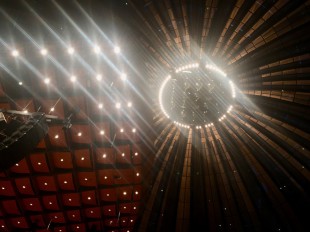
Music
April 9 - Tonhalle Duesseldorf: French cellist Gautier Capuçon and the Orchestre de Chambre de Paris perform works by Gioachino Rossini, Joseph Haydn, Maurice Ravel, Jules Massenet and David Popper.
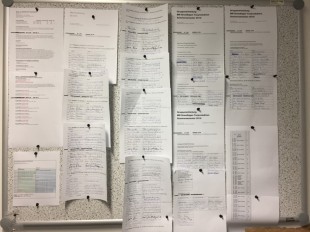
Teaching
April 3 - Start of the summer term at the Institute for Music and Media at Robert Schumann University of Music in Duesseldorf.
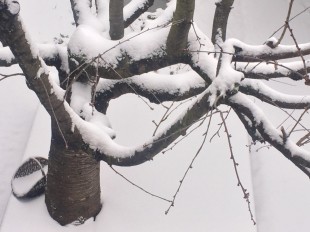
Cherry Tree
March 18 - A gusty northeasterly plays with the fresh snow on the branches - where is spring?

Live Music
March 10 - Jazz Initiative Bingen at Binger Buehne: Alvin Mills Project | Looking Past Forward. Michael Quast (keys), Arno Haas (sax), Stefan Hoefele-Dias (drums) and Alvin Mills (bass). Groovy slap bass meets funky singing sax.
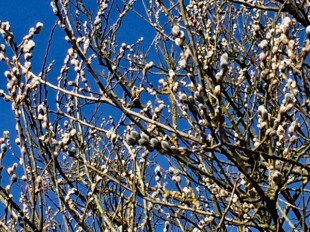
Seasons
February 25 - Early signs of spring.
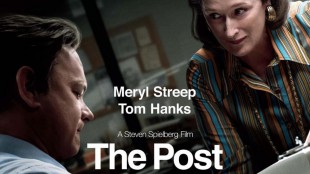
Movies
February 23 - At Palatin in Mainz: Die Verlegerin (The Post) by Steven Spielberg. With Meryl Streep and Tom Hanks. Historical drama about the publication of the Pentagon Papers by The New York Times and subsequently The Washington Post in 1971. A must see.
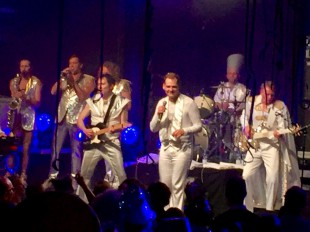
Live Music
February 9 - At Frankfurter Hof in Mainz: 30th anniversary concert by Fred Kellner and the famous Soulsisters, featuring The Horny Horny Horns and The SuperSonic Silver Strings. With Fred Kellner (b), Fred Kellner (dr), Fred Kellner (perc), Fred Kellner (g and voc), Fred Kellner (g) and Fred Kellner (kb and voc). Soul and funk at its best on "the holy holy stage in crazy Mainz". Same soul procedure as every year.
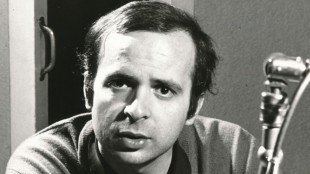
Listening
February 20 - Der Kunstkopf-Mann - Letzte Reise des Tönefängers Matthias von Spallart nach Amazonien (The Dummy Head Man - Last Journey of the Sound Catcher Matthias von Spallart). Radio feature (54 min) by Helmut Kopetzky, produced by NDR and DLF. The program tells the story of sound artist Matthias von Spallart. In fall 1980 he packed a Nagra IV-S recorder, 120 reels of magnetic tape, a dummy head microphone, and bought an airline ticket to Rio de Janeiro. He started at the Amazon River delta and travelled upstream into the little known refuges of the native people of the Amazon rainforest. His binaural 3D recordings where exceptional. But when he came back to the cold and grey European winter he found himself changed. He listened to the recordings and started to edit. But he did not finish. Eight months after his home coming he hanged himself at a tree not far from his house in Alsace. His friend, radio man Aldo Gardini, took on the task to finish the ambitious project. In 1982 the one hour radio feature Brasil - A Sound Journey into the Interiors of Brasil went on air. The recordings take the listener (headphones!) into an amazing 3D soundscape. The production received the highest critical acclaim and is - until today - an unriveled standard for aspiring (field-) sound artists.
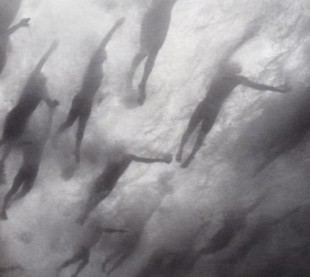
Reading
February 10 - Eliot Weinberger: An Elemental Thing (2007), an anthology of interconnected nonfiction essays. The first essay in the book is called The Wind. It starts: “Wind: what is it? You don’t see it but you hear it, and you feel its force. It brings the rains, the drought, the cold, the heat, the locusts, the dust; it drives them away. It bangs the shutters, rustles the branches, flattens the house, spreads fire; it pushes the boats along or makes the waves that sink them. It’s breezes in spring inspire affection, its howling in winter dread...“ And after two pages it ends: Hear the wind and you will know the wind. Wind blows, and the generations are leaves. There was no higher praise than what was said of Confucius: He knows where the wind comes from.”
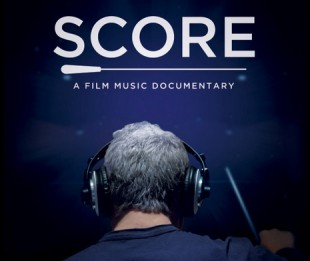
Documentary
February 1 - At Filmbuehne Caligari in Wiesbaden: Score - A Music Film Documentary by Matt Schrader, featuring more than 50 composers, directors, orchestrators, studio musicians, producers, recording artists, studio executives, agents and journalists. With Hans Zimmer, Qincy Jones, Randy Newman, Danny Elfman, Rachel Portman, John Powell, Mychael Danna, Howard Shore, John Williams and Trent Reznor. The production was financed via crowdfunding.
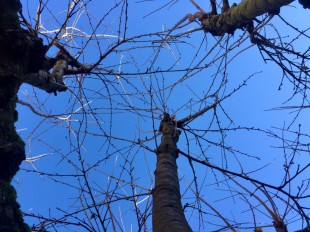
Cherry Tree
January 16 - To prune or not to prune? An old gardener’s wisdom says: “Prune weak branches strongly and strong branches weakly”. It also says, that you should be able to throw your hat through the tree, as a sign that the branches are not too crowded.

New Year
January 6 - A luxurious start into the new year.